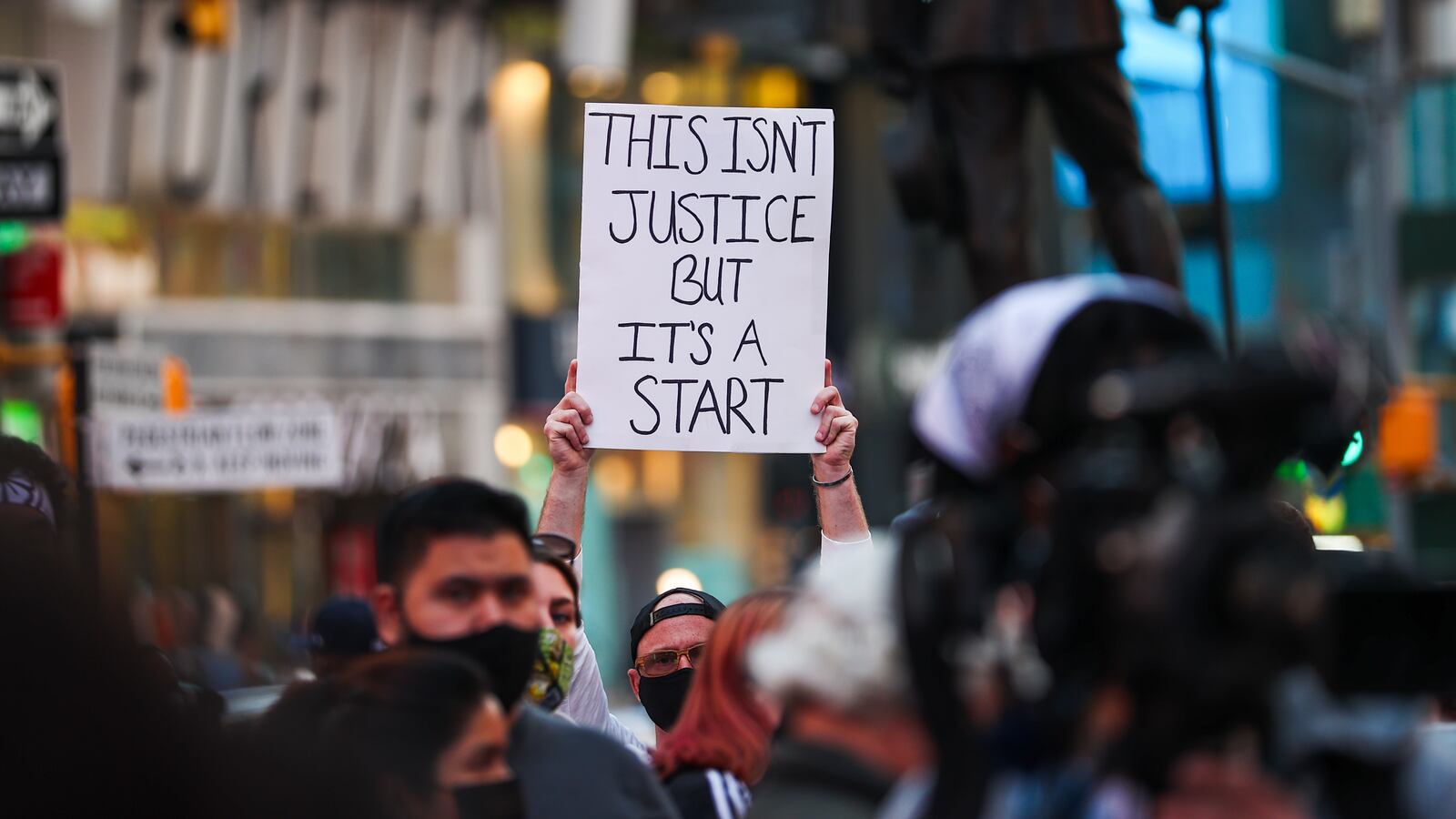Cops responding to public celebrations around New York City after the conviction of disgraced Minneapolis police officer Derek Chauvin reversed their license plates and spray-painted them black as part of an effort to make at least four official vehicles “mean looking” and not “readily identifiable.”
That’s according to a Dec. 13 arbitrator’s decision obtained by The Daily Beast, which upheld the Port Authority Police Department’s decision to fire Sgt. John Passarotti, a 22-year veteran assigned to the PAPD’s elite Counterterrorism Unit (CTU) at JFK International Airport. Passarotti, who admitted giving the order to obscure the plates, supervised a team of six officers who expressed concern about the scheme. But, as one of them told investigators, “I figured it was an order from the sergeant, so I wouldn’t, I didn’t question it.”
Passarotti, who is also a member of the New York State Guard, as well as the treasurer of the Port Authority Sergeants Benevolent Association, “intended to leave the plates obscured until the ‘protest activity decreased,’” the decision says.
He was finally caught when he crashed one of the vehicles in question, and a member of the PAPD brass spotted the spray-painted plates in photos of the accident. Passarotti subsequently argued that because CTU is a “stealth” unit, what he did was “in line with what I believed the intention of my supervisors were,” and threw a PAPD assistant chief under the bus along the way, according to the decision.
"Based at the time that I was making the decisions, I believe, and still believe, that I did not violate any laws,” an unrepentant Passarotti insisted to investigators, the decision states. “I don’t believe that I, what I did, was in any way misconduct.”
Police arbitrations are, in general, highly secretive, and decisions and awards documentation is often off-limits to the public. The arbitrator’s decision in the Passarotti case brings to light an incident of police wrongdoing that has not been revealed until now.
Attorney Craig Kozan, who represented the Sergeants Benevolent Association on behalf of Passarotti in the administrative disciplinary proceedings, told The Daily Beast, “Unfortunately, I have no authority to speak on behalf of the SBA with regard to this matter.”
Passarotti was unable to be reached on Tuesday. The Port Authority declined to comment.
Following the May 2020 murder of George Floyd, an unarmed Black man, street protests erupted across the country. Clashes between protesters and law enforcement were routine, and as tensions escalated, cops in numerous cities began covering up their nameplates and badge numbers, or removing them altogether. In Portland, Oregon, where the demonstrations had become particularly intense, the Trump administration unleashed federal agents in camouflage driving unmarked vans around town, detaining protesters at will, without identifying themselves.
In the months before Chauvin was found guilty on April 20, 2021, Assistant Chief Steven Rotolo testified during the Passarotti hearings that CTU officers formed the “backbone of our protest response,” according to the decision. They would “frequently be required to respond to locations in New York City,” traveling in a caravan of vehicles, Rotolo said.
On the day of the Chauvin verdict, before Passarotti and his team headed into Manhattan, he “ordered the POs in his command to flip over the license plates on their CTU vehicles and display the silver back of the plate,” the decision states. It says one of the officers told the PAPD’s Police Integrity Unit (PIU) that Passarotti said he wanted to “coordinate [the] drive to the city … I just wanna have the plates reversed while we’re drivin’ back and forth. I did it on the van.”
Passarotti “gave us a screwdriver and told us to rotate the plates around,” the officer told investigators. “His was already done.”
The next day, Rotolo was at JFK when he spotted the reversed front plate on Passarotti’s vehicle, according to the decision.
“You can’t do this,” Rotolo said he told Passarotti.
Passarotti claimed that “the plates had been reversed to avoid red light camera summonses going back and forth to New York City,” the decision states. Following some more back-and-forth between the two, Passrotti told investigators that Rotolo said, “You know what, I don’t care, you don’t work for me anymore.” (Rotolo denies ever saying this.)
But Passarotti took no action to restore the license plates back to normal on the undercover vehicles, nor did he instruct any of his underlings to do so.
“Instead, on April 25, 2021, Sgt. Passarotti told his subordinate officers to paint the license plates black,” the decision states.
Passarotti “gave him a can of paint and two rubber gloves and told him that, ‘I don’t like the look of the silver ... spray the plates,’” according to the decision. “I told him I don’t think it’s a good idea, but I didn’t want to get into an argument with the guy,” the cop later told investigators.
On April 27, while Passarotti was on the job at JFK, he crashed one of the vehicles with the blacked-out plates, the decision continues. When Rotolo got the accident report, which included photos of the scene, he saw the plates over which he had previously scolded Passarotti remained affixed to the SUV. Rotolo brought the pictures to the PIU, the PAPD’s internal affairs unit, and an investigation was opened, according to the decision.
When questioned by PIU investigators, Passarotti doubled down on his red-light ticket claims.
The CTU vehicles often did not use lights and sirens at the George Floyd demonstrations because, according to Passarotti, they “were trying to elude protestors to get to certain positions,” the decision states. (Police vehicles traveling with their lights and sirens on are exempt from having to pay the tickets, but otherwise, the driver is responsible, it says.)
“Sgt. Passarotti testified that his actions were a ‘temporary work around’ to buy time until a better option could be implemented to avoid issues with red light summons,” according to the decision.
Passarotti insisted he was not at fault, and laid the majority of the blame firmly at Rotolo’s feet, pointing to the chief as having “created a CTU culture or image of ‘stealth, intimidation and undetectability’ and wanted CTU vehicles to not ‘be readily identifiable’ and ‘mean looking,’” the decision states. He also “explained that based on his experience working with Chief Rotolo, he was a clear and direct communicator, so if the Chief meant that the plates should be returned to their prior display, he would have said so,” the decision goes on.
“Further, he stated that if Rotolo had given him such an order, he would have promptly reversed the plates, and would have ‘asked the chief for a better suggestion to this problem’ concerning the red light summonses,” it says.
Yet, the red light story fell flat when PIU checked the 11 summonses JFK CTU vehicles had received between May 2020 and May 2021, according to the decision.
“Only one was issued in 2021—on April 16, 2021, [to] the vehicle with NYS license plate HRD-7347, which is PA vehicle # 50110, often driven by Sgt. Passarotti,” it says. “All of these summonses in that one year [period] were for speeding in a school zone; none were for red light violations.”

Passarotti abused his authority in ways that cause “members of the public to view police officers with a jaundiced eye and diminishes public trust,” the decision concludes. It says Passarotti obscured the license plates “during the CTU’s response to peaceful protests, when there was a heightened need to behave in a manner to increase public confidence in police and police institutions.”
In all, Passarotti “demonstrated ‘an intolerable paucity of judgment,’” and the Port Authority moved to terminate him, which the arbitrator upheld on Dec. 13, the decision states.
When the Port Authority Sergeants’ Benevolent Association—the union representing PAPD sergeants—tried to halt the firing on procedural grounds, Port Authority lawyers asked a judge to make the arbitrator’s decision final. The decision itself was filed as an exhibit among the 11 filings the bi-state agency submitted in court, thus becoming part of the public record.
Employment attorney Derrick Hogan, who is not involved with the Passarotti case, said that while the sergeant’s activities may or may not have been criminal, they were certainly in violation of PAPD rules and regulations.
“If a civilian detached or defaced his or her license plate, and, moreover, did it to avoid traffic summonses, they would be held accountable,” Hogan, a managing partner at Tully Rinckey PLLC, told The Daily Beast. “The same should apply to members of law enforcement and they should, in this situation, be held to the same standard as civilians.”






